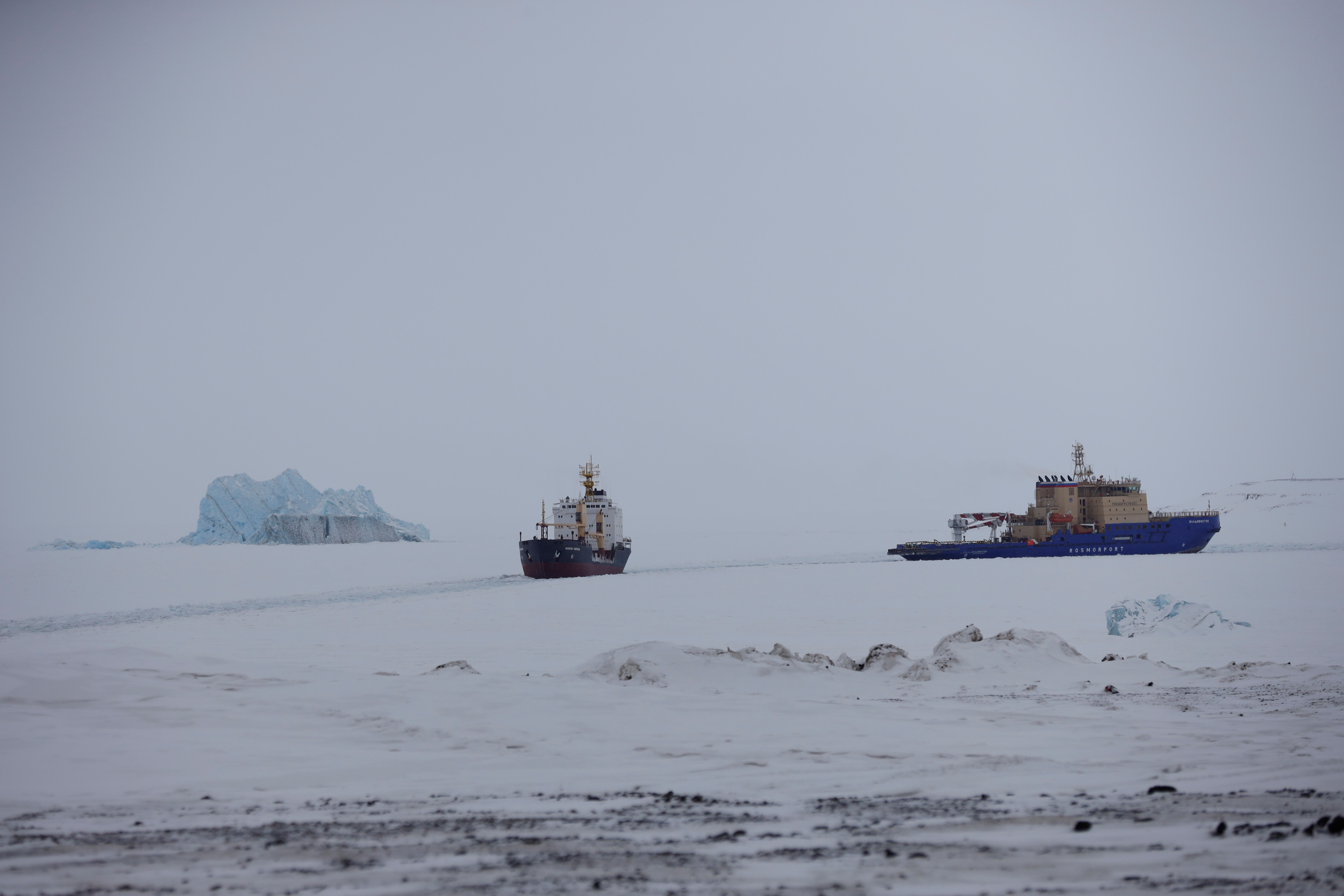Russia returns to Arctic for economy, ecology, security reasons: Putin
Russian President Vladimir Putin discusses the importance of the Russian Arctic at the Ecosystem - Reserved Land youth forum focusing on economic purposes as well as defense capabilities and emergency situations prevention.
-

An Icebreaker making the path for a cargo ship with an iceberg in the background near a port on the Alexandra Land island near Nagurskoye, Russia, Monday, May 17, 2021 (AP Photo/Alexander Zemlianichenko)
Russian President Vladimir Putin said, during the Ecosystem - Reserved Land youth forum on Monday, that Russia had returned to the Arctic for economic purposes as well as to safeguard its sustainable defense capabilities and ensure the prevention of emergency situations.
Putin highlighted that "Russia is returning to the Arctic both from an economic point of view and in terms of ensuring the country's defense capability, as well as from the perspective of preventing emergencies," noting that "We will develop the infrastructure of the [Russian] Ministry of Emergency Situations [EMERCOM] there," additionally "The development of the Northern Sea Route will take place and we have already launched some major economic projects there, including in the energy sector."
The president also argued that the Arctic is an ecologically very "vulnerable" region and required special attention to ensure its protection as it is considered "to a large extent related to the Arctic".
As a result, "what has been accumulated as a result of human activity over the past decades," such as rubbish disposal and the establishment of favorable conditions that safeguard human life, economic and defense interests, and the interests of conserving the environment as a whole are extremely challenging undertakings.
Read more: Sino-Russian arctic partnership poses challenge to alliance - NATO
On August 25, NATO Secretary General Jens Stoltenberg had stated that cooperation between Russia and China in the Arctic poses a strategic challenge to the values and interests of the alliance.
"Russia has significantly increased its military activity in recent years, setting up a new Arctic Command, opening hundreds of new and former Soviet-era Arctic military sites, including airfields and deep-water ports, and using the region as test-bed for novel weapon system," Stoltenberg wrote in an article for Canadian newspaper The Globe and Mail. "Russia’s ability to disrupt Allied reinforcements across the North Atlantic is a strategic challenge to the Alliance."
China is also expanding its presence in the region, declaring itself a "near-Arctic state" and planning to create a "Polar Silk Road" connecting it with Europe through the Arctic, Stoltenberg wrote.
"Earlier this year, Beijing and Moscow pledged to intensify practical co-operation in the Arctic, as part of a deepening strategic partnership that challenges our values and interests," the NATO chief wrote.
Stoltenberg added that Finland's and Sweden's accession to NATO would significantly strengthen the alliance's position in the Far North.
Russian Defense Minister Sergei Shoigu previously said that the official participation of Helsinki and Stockholm in NATO strategic planning and the possible provision of the territory of these states for the deployment of strike weapons would change the security conditions in the Baltic region and the Arctic, and would require a revision of approaches to the defense of Russian territory.
Nikolay Korchunov, Russia's Ambassador-at-Large for Arctic Cooperation, said on May 22 that the Arctic area has become an "international theater of military operations" since Finland and Sweden filed for NATO membership.
On May 24, it was reported that the US plans to invest billions in Arctic defense, including modernizing its Thule Air Base in Greenland, citing an American military report. The report detailed that neither Denmark nor Greenland had been informed of the plans.

 3 Min Read
3 Min Read








